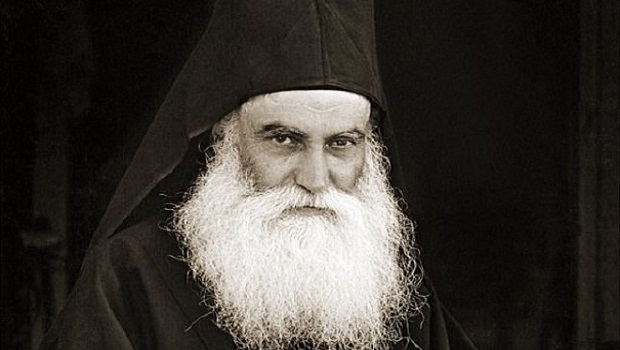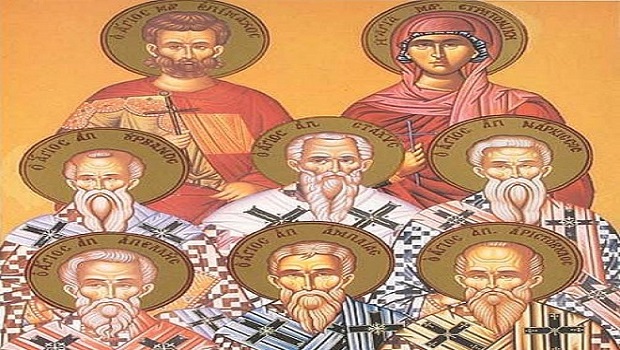Panteleimon Lambadarios
In today’s Gospel reading, Our Lord Jesus Christ narrates the parable of the talents. He sets before us a serious problem, which should concern all of us. Every one of us has been endowed by God with a variety of talents, gifts and abilities. We should look on these as gifts from God, Who has entrusted us with them. We shall have to answer to Him for the way in which we’ve used them.
In his interpretation of the parable of the talents, Saint John Chrysostom explains that, by the term ‘talents’, the Lord means the power and ability we each have to do good by using them responsibly and in a way pleasing to God. So we’re in an official position, we have a kind of office, we’re high up in the administration, whether this means we have money, or we’re gifted speakers or proficient teachers or whatever else we may be. Everything is a ‘talent’ given by God.
According to the parable, ‘the talents’ are given by God to His servants. Generally, in the Scriptures, God calls us His children, but here He says ‘servants’. He does so to show that we’re responsible to Him and that we should be perfectly obedient to Him. Not because we’re servants but because God’s law is perfect and is a benefit to everyone. Those who follow His law are really made free and are obliged to submit themselves to Him in perfect obedience. Besides, our Lord himself, Jesus Christ, became the model for all of the faithful. For our sake he became a ‘servant’; he humbled himself so greatly; and he subjected himself to God’s will even to the extent of dying for it. ‘Who, being in very nature God, did not consider equality with God something to be used to his own advantage; rather, he made himself nothing by taking the very nature[of a servant, being made in human likeness. And being found in appearance as a man, he humbled himself by becoming obedient to death- even death on a cross’.
The master in the parable gave the talents to his servants and left at once on a long journey. God gives us His talents, our various abilities, but doesn’t then sit over us in a lordly and tyrannical manner in order to threaten and force us. He leaves us to manage those talents as we see fit. And even if, in most instances, we don’t manage them very well, but act on impulse and without faith, He continues to respect our freedom and remains far away. He patiently extends His forbearance to us until the right time comes for Him to seek an answer from each of us.
The talents are given us to use responsibly and we’ll have to account for them. Time passes, the account will be requested and we’ll have to render it. This presentation is unavoidable and Christ was careful to insist often, in other parables, that it will certainly take place (Matth. 18, 23-24; Luke 19, 11-26).
But if the talents are our own, why should we have to account for our use of them? Our abilities may, indeed, be our own, but we’ve received them from God. They are ours by nature or are gifts of the Holy Spirit, so, in either case, we owe God for them. This is why, in the parable, the Lord says that the master gave the servants his possessions. We should see any talents we have as God’s possessions, given to us by Him. If we do, we’ll manage them, as divine resources, to the best of our abilities, in accordance with the guidelines and instructions given to us by God Himself.
Our Lord Jesus Christ recognized this responsibility in himself. When, for example, the citizens of Capernaum insisted that he stay in the town for good, he replied: ‘I must proclaim the good news of the kingdom of God to the other towns also, because that is why I was sent’ (Luke 4, 43). Saint Paul also understood his responsibility for spreading the Gospel to be a talent, which is why he wrote to the Corinthians: ‘Woe betide me if I do not preach the Gospel’ (1 Cor. 9, 16).
Our responsibility for each of our actions, for the way we employ our talents and abilities is general for all of us. The Lord himself tells us that we’re all going to be held accountable for our actions: ‘For the Son of Man will come in his Father’s glory, with his angels, and then he will repay each person according to what they have done’ (Matth. 16, 27). And Saint Paul declares that ‘each one of you will answer to God concerning yourself’ (Rom. 14, 12).
So may this awareness of our responsibility towards God and of rendering an account to Him be with us throughout our life. Great or limited though our abilities may be, may we deploy them with a sense of our own responsibility. It’s not enough to just do something; we have to multiply our talents in accordance with the measure in which we received them. Woe betide the person who receives even one talent and then hides it.
This is why we should accept our various talents with humility and gratitude and strive to multiply them for the glory of the Holy, Consubstantial and Undivided Trinity. Amen.
Source: pemptousia.com




0 Comments